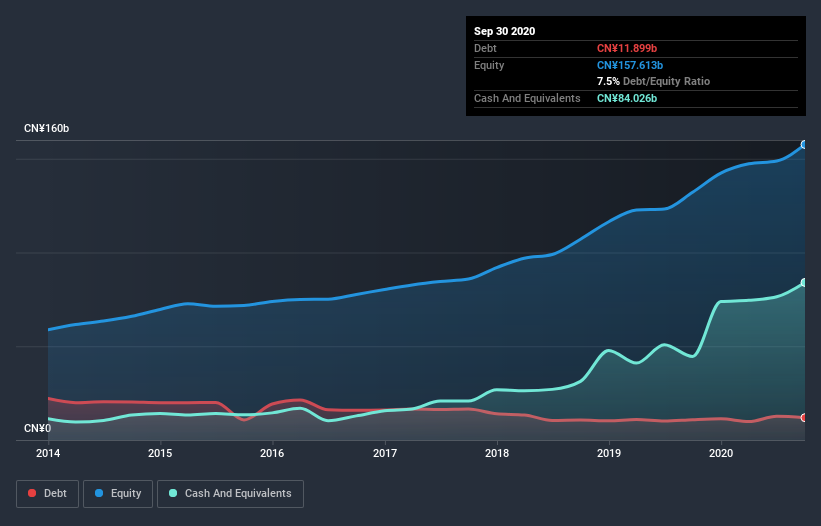
The external fund manager backed by Berkshire Hathaway's Charlie Munger, Li Lu, makes no bones about it when he says 'The biggest investment risk is not the volatility of prices, but whether you will suffer a permanent loss of capital.' It's only natural to consider a company's balance sheet when you examine how risky it is, since debt is often involved when a business collapses. We can see that Anhui Conch Cement Company Limited (HKG:914) does use debt in its business. But the real question is whether this debt is making the company risky.
What Risk Does Debt Bring?
Generally speaking, debt only becomes a real problem when a company can't easily pay it off, either by raising capital or with its own cash flow. If things get really bad, the lenders can take control of the business. However, a more frequent (but still costly) occurrence is where a company must issue shares at bargain-basement prices, permanently diluting shareholders, just to shore up its balance sheet. Of course, debt can be an important tool in businesses, particularly capital heavy businesses. When we think about a company's use of debt, we first look at cash and debt together.
Check out our latest analysis for Anhui Conch Cement
What Is Anhui Conch Cement's Debt?
As you can see below, at the end of September 2020, Anhui Conch Cement had CN¥11.9b of debt, up from CN¥10.8b a year ago. Click the image for more detail. However, its balance sheet shows it holds CN¥84.0b in cash, so it actually has CN¥72.1b net cash.

How Strong Is Anhui Conch Cement's Balance Sheet?
Zooming in on the latest balance sheet data, we can see that Anhui Conch Cement had liabilities of CN¥30.2b due within 12 months and liabilities of CN¥8.83b due beyond that. Offsetting this, it had CN¥84.0b in cash and CN¥15.0b in receivables that were due within 12 months. So it actually has CN¥60.0b more liquid assets than total liabilities.
This surplus suggests that Anhui Conch Cement is using debt in a way that is appears to be both safe and conservative. Given it has easily adequate short term liquidity, we don't think it will have any issues with its lenders. Simply put, the fact that Anhui Conch Cement has more cash than debt is arguably a good indication that it can manage its debt safely.
The good news is that Anhui Conch Cement has increased its EBIT by 2.9% over twelve months, which should ease any concerns about debt repayment. When analysing debt levels, the balance sheet is the obvious place to start. But it is future earnings, more than anything, that will determine Anhui Conch Cement's ability to maintain a healthy balance sheet going forward. So if you're focused on the future you can check out this free report showing analyst profit forecasts.
Finally, while the tax-man may adore accounting profits, lenders only accept cold hard cash. While Anhui Conch Cement has net cash on its balance sheet, it's still worth taking a look at its ability to convert earnings before interest and tax (EBIT) to free cash flow, to help us understand how quickly it is building (or eroding) that cash balance. Over the most recent three years, Anhui Conch Cement recorded free cash flow worth 74% of its EBIT, which is around normal, given free cash flow excludes interest and tax. This free cash flow puts the company in a good position to pay down debt, when appropriate.
Summing up
While we empathize with investors who find debt concerning, you should keep in mind that Anhui Conch Cement has net cash of CN¥72.1b, as well as more liquid assets than liabilities. And it impressed us with free cash flow of CN¥30b, being 74% of its EBIT. So we don't think Anhui Conch Cement's use of debt is risky. There's no doubt that we learn most about debt from the balance sheet. However, not all investment risk resides within the balance sheet - far from it. Be aware that Anhui Conch Cement is showing 2 warning signs in our investment analysis , and 1 of those is concerning...
If, after all that, you're more interested in a fast growing company with a rock-solid balance sheet, then check out our list of net cash growth stocks without delay.
When trading Anhui Conch Cement or any other investment, use the platform considered by many to be the Professional's Gateway to the Worlds Market, Interactive Brokers. You get the lowest-cost* trading on stocks, options, futures, forex, bonds and funds worldwide from a single integrated account. Promoted
New: Manage All Your Stock Portfolios in One Place
We've created the ultimate portfolio companion for stock investors, and it's free.
• Connect an unlimited number of Portfolios and see your total in one currency
• Be alerted to new Warning Signs or Risks via email or mobile
• Track the Fair Value of your stocks
This article by Simply Wall St is general in nature. It does not constitute a recommendation to buy or sell any stock, and does not take account of your objectives, or your financial situation. We aim to bring you long-term focused analysis driven by fundamental data. Note that our analysis may not factor in the latest price-sensitive company announcements or qualitative material. Simply Wall St has no position in any stocks mentioned.
*Interactive Brokers Rated Lowest Cost Broker by StockBrokers.com Annual Online Review 2020
Have feedback on this article? Concerned about the content? Get in touch with us directly. Alternatively, email editorial-team@simplywallst.com.
About SEHK:914
Anhui Conch Cement
Manufactures, sells, and trades in clinker and cement products in China and internationally.
Undervalued with excellent balance sheet and pays a dividend.
Market Insights
Community Narratives



